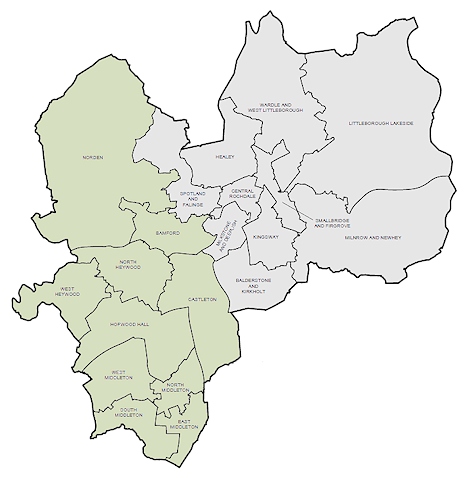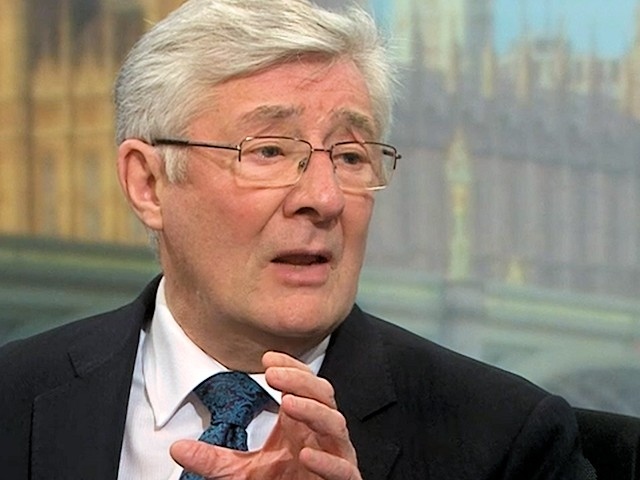2023 review launched on redrawing parliamentary constituencies
Date published: 14 January 2021

The current Heywood & Middleton constituency (pale green) and Rochdale constituency (pale grey) boundaries
The independent Boundary Commission for England (BCE) has begun a new review of all parliamentary constituencies in England.
The move follows a decision by Parliament in December 2020 to retain the number of constituencies in the UK at 650, and to ensure that there are roughly the same number of electors in each constituency.
Geographical boundaries of the UK’s 650 constituencies will be redrawn to each contain a near equal number of eligible voters. This means the number of electors in each recommended mainland English constituency must be no less than 69,724 and no more than 77,062.
The electorate of the two local constituencies when the last general election was held at the end of 2019 stood at 80,162 for Heywood and Middleton and 78,909 for Rochdale - both currently over the new recommended limit in the review.
The passing of the Parliamentary Constituencies Act 2020 means the previous 2018 review, launched in 2016, will not be implemented.
The 2018 review had proposed splitting the Rochdale borough into three constituencies, combining Littleborough with Saddleworth; Middleton with Prestwich, and Rochdale (including Heywood).
Read more: Boundary commission revised constituency proposals leave the borough carved up into three constituenciesPublished: 17 October 2017
The BCE is tasked with making independent recommendations about where the boundaries of English constituencies should be.
England will have 543 constituencies, ten more than there are currently. The commission has also decided how those constituencies will be distributed among the English regions.
The BCE now begins work on its initial proposals for new boundaries, which are expected to be published in early summer 2021.

Responding to the news, Chris Clarkson, MP for Heywood and Middleton, said: “The review of Westminster Constituencies is a welcome and long overdue process. Electorates across Greater Manchester now range from around 62,500 to 95,000 meaning some people’s votes count 50% more than others and that can’t be right or fair.
“Under this process Greater Manchester will still have 27 seats, but these will all be roughly the same size.
“By ensuring fairer, more equal boundaries we can make sure that everyone’s vote carries the same value.
“This is not the same as the previous two reviews, where the proposal was to reduce parliament to 600 seats. Now that we have left the EU, MPs workloads have grown and so the decision has been taken to conduct this review on the basis of retaining 650 seats – this, in conjunction with significant changes in the electorate since 2018 mean that any proposals which come forward will be radically different from previous plans.
“There will naturally be a lot of conjecture as to what that means for the constituencies covering our borough, but I would caution people against speculating until the independent Boundary Commission has made its first set of proposals. The truth is we don’t know anything until this is published.
“Once the Commission’s first draft been drawn up there will be an opportunity for people to have their say and make recommendations to the Commission based on their local knowledge so that their final plan best reflects our communities and priorities. I would encourage everyone to have their say when we reach this part of the process.
“As a member of the Bill Committee which steered this through Parliament I have had a chance to properly scrutinise the proposed review system and believe that it represents a much needed improvement, removing the right for MPs to veto reviews as happened in 2013 to suit their own political interests.
“The next election should take place on fair boundaries which give everyone an equal say and that is what this review will do.”

Tony Lloyd, MP for Rochdale said: "Parliamentary boundaries have to be fair and whilst that means reasonably equal numbers of electors per constituency, it also means keeping natural communities together. The decision by the Conservative / Lib Dem coalition government to try to fix constituencies in a way which gave political favour to political parties was corrupt and it cut the number of constituencies to 600, and narrowed the ability of constituencies to keep communities together.
"The Boundary Commission Report of 2018 had to be abandoned because the boundaries it proposed for a town like Rochdale, across council boundaries were ludicrous, and up and down the country this process was seen as unfair. One constituency was split by the River Mersey at one of its widest points which meant a many mile road trip out of the constituency to get to the other side (or a rowing boat across the river!) Crazy. It was so bad that in the end even Conservative MPs revolted and Parliament went back to the drawing board.
"Even now the framework the government has set means that we are likely to see unnatural communities put together once again, but will not know this for some years when the first substantial proposals emerge.
"If there is one lesson in this, it’s to ask politicians not to fix the constituency boundaries to favour their own political party. It’s a lesson this government hasn’t properly learned yet."
Speaking on Friday 8 January, Tim Bowden, Secretary to the Boundary Commission for England said: “Today marks the start of our work to review the constituency boundaries in England. Parliament has set strict rules on greater equality of electorate size between the new constituencies – these rules and the increase in total number of constituencies in England mean that there is likely to be a large degree of change across the country.
“Once we publish our initial proposals in the summer, we will need the help of residents in all regions to ensure that our proposals take account of local ties and best reflect the geography on the ground. Everyone’s views will help us recommend a well-considered and practical set of new constituency boundaries in England.”
Constitution Minister, Chloe Smith said: “Up-to-date, more equally sized constituencies is a sensible policy that will make our elections fairer, ensuring that people from all four nations of the UK have equal representation in Parliament.”
The publication of those proposals will begin an eight week consultation period, whereby comments will be invited by local residents.
In early 2022, the BCE will also be travelling across England to hear from people in person.
All comments will help the commission further refine the boundary proposals before views are sought on any revisions later in 2022.
The commission must submit its final report and recommendations to the Speaker of the House of Commons by July 2023.
Do you have a story for us?
Let us know by emailing news@rochdaleonline.co.uk
All contact will be treated in confidence.
Most Viewed News Stories
- 1Middleton school hails another outstanding inspection result
- 2Former councillor and hospital campaigner Jean Ashworth has died
- 3Drugs and cash seized during morning raids at suspected stash houses
- 4No trams between Oldham and Rochdale this Sunday
- 5Northern Healthcare opens supported living service in former Rochdale hotel
To contact the Rochdale Online news desk, email news@rochdaleonline.co.uk or visit our news submission page.
To get the latest news on your desktop or mobile, follow Rochdale Online on Twitter and Facebook.


